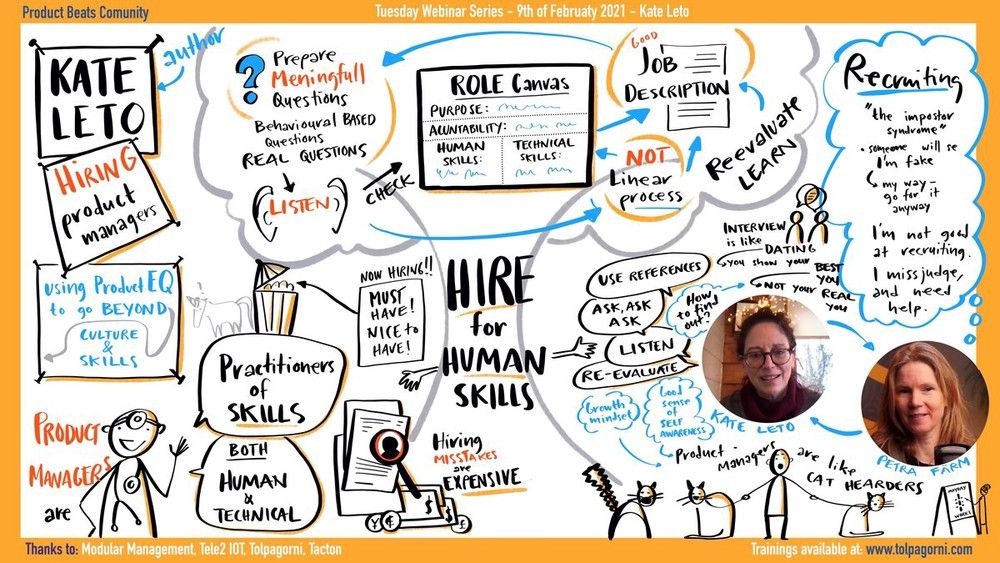Episode 44: Hiring Product Managers w/Kate Leto
9 February, 2021 / Host: PETRA FÄRM
Mastering Product EQ for Successful Recruitment
Are product managers really cat herders? At the very least, most of us lack formal authority and need to rely on other things to build sustainable and lovable products. So, how do you identify a cat herder?
In the latest episode of The Proudctbeats Show, Kate Leto author of “Hiring Product Managers: Using Product EQ to go beyond culture and skills” has created a deceivable simple to tool to help in the process. With over 20 years of product management experience, Leto emphasizes the importance of balancing technical skills and human skills in the hiring process. This article provides insights and practical steps based on Leto's recently released book, offering valuable guidance for organizations looking to improve their hiring practices.
Building a Role that Matters
When it comes to job descriptions for product managers we must move away from unrealistic expectations and crafting roles that are meaningful and aligned with organizational goals. Instead of the conventional approach of listing technical skills as must-haves and human skills as nice-to-haves, Leto proposes using a Role Canvas. This canvas comprises four key questions:
- purpose,
- accountabilities,
- technical skills, and
- human skills.
By balancing these elements, organizations can create role descriptions that accurately reflect the requirements of the position.
Leto highlights the need for organizations to prioritize both technical and human skills, as they are intertwined and essential for effective product management. Technical skills encompass tasks such as building product roadmaps, developing vision statements, and conducting A/B testing. On the other hand, human skills include influence, leadership, resilience, conflict resolution, emotional intelligence, and relationship management. By recognizing the significance of these skills, organizations can enhance their hiring processes and build stronger product teams.
Preparing Meaningful Questions
Instead of relying on brain teaser questions or technical inquiries, Leto advocates for using behavioral-based interview questions that provide valuable insights into candidates' past experiences and behaviors. These questions should be designed to assess specific competencies required for the role, such as conflict resolution or collaboration. By asking candidates to describe situations they have encountered and how they handled them, interviewers can gain a deeper understanding of their problem-solving abilities, adaptability, and interpersonal skills.
Leto suggests that interviewers should actively listen to candidates' responses and dig deeper to uncover the thought processes behind their actions. This allows for a comprehensive evaluation of how candidates align with the desired human skills identified in the role canvas. Furthermore, Leto recommends referring to resources like "The EQ Interview" for a comprehensive set of behavior-based interview questions that cover various facets of emotional intelligence.
Reflecting and Responding Along the Way
To improve the hiring process, Leto emphasizes the need for continuous reflection and responsiveness. Organizations should acknowledge that hiring is not a linear process that ends with an offer but an opportunity for continuous improvement and learning. Leto introduces the concept of calibration meetings and role retrospectives to facilitate ongoing evaluation and adjustment. Calibration meetings involve the hiring team discussing their progress and aligning their expectations, while role retrospectives are conducted three to six months after a hire to evaluate the effectiveness of the role itself.
By adopting an iterative approach to hiring, organizations can ensure they are continuously adapting and refining their processes. This mindset of continuous improvement aligns with the principles of product management, allowing teams to grow and learn from each hiring experience.
Takeaways
- Embrace the power of product EQ: When hiring product managers, it's crucial to go beyond technical skills and culture fit. Look for candidates who possess strong emotional intelligence, empathy, and the ability to collaborate effectively with cross-functional teams.
- Build meaningful job roles: Create job descriptions that clearly define the expectations and responsibilities of the product manager role. Be specific about the desired skills and attributes, including both technical expertise and human skills.
- Ask behavior-based interview questions: Instead of relying solely on hypothetical scenarios, ask candidates to provide examples of how they have handled real-life situations in their previous roles. This approach allows you to assess their problem-solving abilities, decision-making skills, and their capacity to navigate challenges in a product management context.
To further enhance your understanding of effective product management practices and develop your skills in this dynamic field, consider enrolling in The Productbeats Product Management Certification Program. This comprehensive program is designed to equip aspiring and experienced product managers with the knowledge and tools they need to excel in their roles. Whether you're looking to kickstart your career or take it to the next level, this certification program offers a structured curriculum, hands-on learning experiences, and industry-recognized credentials. With a focus on practical application and real-world scenarios, The Productbeats Program ensures you'll be well-prepared to tackle the challenges and seize the opportunities that come with product management. Invest in your professional growth and join the ranks of successful product managers by enrolling in The Productbeats Product Management Certification Program today.
You might also enjoy watching...
Copyright © 2023 ProductBeats AB

Get The Program Brochure
Submit the form below to have The Program Brochure delivered to your inbox
The title of the notification
The descriptive text of the notification


